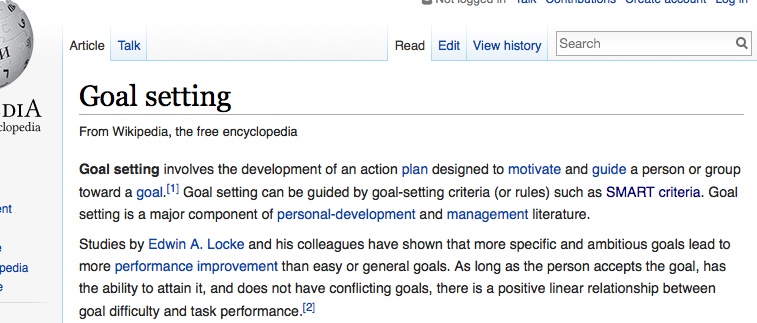Goals are important for a multitude of reasons, and yes, they are as important as habits. For more on this, please see the prior post. (link)
In fact, there is a powerful relationship between the two that has somehow been lost for a very long time (more on that below). Please recognize that goals help you to understand and appreciate what habits you must craft in order to achieve those goals. And, those positive habits, once crafted, help to drive the goal’s attainment much more quickly.
If the goal is to be a better person (probably not the most well-articulated goal, but we’ll go with it nonetheless), the habits you might begin to track and develop would revolve around service and kindness to others (for starters).
If your goal is to be a great soccer player, your habits would encompass fitness, skills, and footwork, to name a few.
The point is that the GOAL itself will illuminate the habits you’ll need to achieve that goal.
It’s a bit hard to believe, but this practical and seemingly commonsense process for goal achievement did not exist as a published theory prior to The Habit Factor’s publication in 2010. And, even with it now being more than five years old, and having some modest popularity, it’s still somewhat nouveau.
Here is a video I produced about a year after The Habit Factor® was published (still five years ago); in it you’ll note that I point out how the word “habit” is missing from Wikipedia’s “Goal Achievement Theory” page.
Again, that was almost five years ago, and if you were to check Wikipedia even today that word, “habit,” is still missing.
Check out this article and some interesting points re: Goal achievement Theory.

Again, not a single mention of the word “Habit“.

I am confident that this will change soon (of course I said that five years ago, so soon is relative apparently).
Here are a few fascinating paragraphs/sentences (screenshots above) that read:
“Edwin A. Locke began to examine goal setting for over thirty years.” And, this is where it gets “fun” — notice the next sentence: “Locke derived the idea for goal-setting from Aristotle’s form of final causality. Aristotle speculated that purpose can cause action; thus, Locke began researching the impact goals have on human activity.”
So, why do I say that is “fun” or maybe even “funny”? Well, consider that “purpose” really just equates to one’s goal (ambition and direction) and “action” could easily equate to one’s habit— that is, repeated actions become habit.
That’s right! We quickly recognize that we’ve come full-circle — how our goals help to determine what behaviors/habits we ought to develop AND, at the same time provide the motivation to develop that new behavior/habit.
What is a bit amazing (or, strange) is this idea that after 30 plus years of research dedicated to Goal Theory, habit had been overlooked and omitted as one of the FIVE principles Locke identified (below). Yes, Locke is the man behind the S.M.A.R.T. Goal Setting process.
Here are the five principles for your review:
Clarity
Goals should be clear, unambiguous, measurable, and have definite completion times.
Challenge
Challenging goals help drive people to work harder to achieve them. (See: The Theory of Goal Setting & Task Performance)
Commitment
Ownership of a goal enhances the likelihood of its accomplishment. Organizations should encourage employees to craft goals for themselves that are consistent with the organization’s own goals.
Feedback
Feedback is required to assess one’s progress. Feedback might be from yourself or from other people.
Task complexity
Highly complex goals can become overwhelming for people. For such goals, people need to be provided sufficient time to work toward the goal, improve performance, practice, or learn what is necessary for success.
These are all excellent criteria or principles. Again, SMART goals is a great process, as well. However, it is truly a mistake for anyone (going forward) not to identify the habits that will help them more quickly achieve their goal and begin to diligently craft and track those habits. The absence of habit from goal achievement theory has come to an end… ; ) I’m sure of it.
The interesting thing is, with slightly different language/synonyms, “habit alignment” truly has its roots with Aristotle who, for various other reasons, is all over The Habit Factor book anyway.
More to come,
~mg